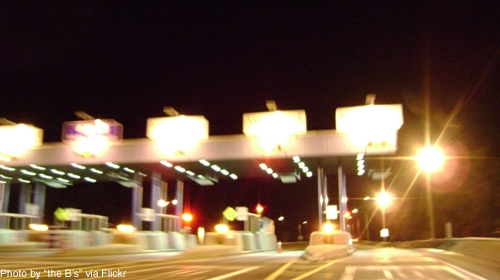
David Sirota of the International Business Times last week that Gov. Chris Christie of New Jersey and his appointee, the deputy governor of the Port Authority of New York and New Jersey, had released a political opponent's private tollbooth data in order to embarrass him.
Under criticism from the late Sen. Frank Lautenberg at a hearing on toll increases, the Port Authority official, Bill Baroni, fought back, as Sirota describes:
"Respectfully, Senator, you only started paying tolls recently," Baroni said, according to a of the. "In fact, I have a copy of your free E-ZPass," he continued, holding up a physical copy of the toll pass Lautenberg had received as a benefit from his tenure as a Port Authority commissioner. "You took 284 trips for free in the last 2 years you had a pass."
The next day, in a press conference, Christie used the data to attack Lautenberg more specifically about the details of his travel:
I find it interesting, too, by the way, in 2005 and 2006, that he went over the Hudson River 284 times. Where was he going?... I think he needs to answer that. 'Cause he's supposed to be the senator from New Jersey. So what's he doing going over the bridge or through the tunnel to New York three or four times a week for 2005 and 2006?... Did he ever spend any time in New Jersey?
MSNBC also has a story on this with of Christie and Baroni's attacks.
As I told Sirota, this incident ties together a lot of the reasons we worry about privacy: that location data is very personal (as we tried to convey last year in this video). That information is power and always raises the temptation for abuse through Nixonian dirty tricks, embarrassment of rivals, or leverage over critics. And that every incident of abuse that actually happens casts a long shadow of chilling effects over those who just worry about how data might be used. If officials feel comfortable using information against a senator, what is a lower ranking political official, let alone ordinary citizen, supposed to conclude about how data could be used against them?
EZ Pass and other electronic toll booth systems should have the option for anonymous use, where money on the devices is treated like cash, for users who prefer privacy to the convenience of having named accounts. A driver, in other words, should be able to buy a transponder for cash, and use cash to store and re-load value on it. The Washington DC Metro system, for example, offers this option for users of its contactless .
Where identifiable location data is collected, it needs to be subject to very strict protections and controls, including immutable audits that record who is accessing what data, and for what legitimate purpose. Those controls need to cover everyone, right to the top.
New Jersey law does that "any information obtained from a toll collection monitoring system" shall be available only to Port Authority and police officials "for the purposes of discharging their duties," and "shall not be discoverable as a public record by any person, entity or governmental agency, except upon a subpoena issued by a grand jury or a court order in a criminal matter."
On Monday, New Jersey Congressman Frank Pallone the Justice Department to investigate Christie and Baroni's use of the tollbooth data. Given that Gov. Christie may run for the White House, presidential politics will no doubt enter the equation here, but it should be a scandal when any political leader uses personal data as a weapon in this way.


